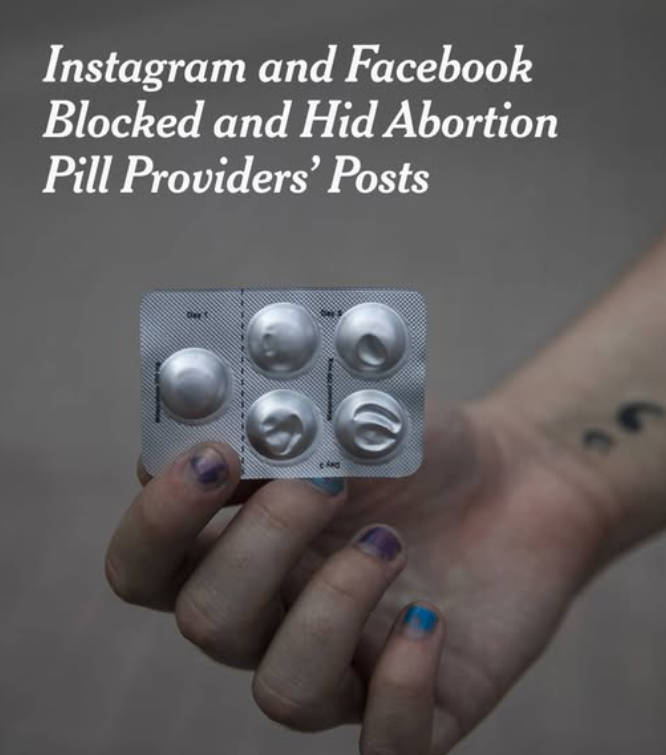Some posts related to obtaining abortion pills were recently hidden on Instagram and Facebook and some accounts were suspended, before being later restored.
“Instagram and Facebook have recently taken steps to blur, block, or remove posts from two abortion pill providers. Additionally, Instagram suspended multiple accounts belonging to abortion pill providers and prevented them from appearing in searches or recommendations.
These actions have intensified over the past two weeks, becoming particularly evident in the last few days, according to the affected providers. Many reported that their content—or in some cases, their entire accounts—were no longer accessible on Instagram.
Meta, the parent company of Facebook and Instagram, confirmed the suspensions and post restrictions. After inquiries from The New York Times, the company restored some of the affected accounts and posts on Thursday.
This development comes as Meta faces scrutiny following a major shift in its content moderation policies. Earlier this month, CEO Mark Zuckerberg announced plans to ease restrictions on online speech, sparking concerns among misinformation researchers and others about potential increases in hate speech and other negative consequences.”
Meta said the moderation of abortion-focused accounts was not related to the change in speech policies. But the timing of the incidents raised questions about whether the company was really loosening speech restrictions, and was another example of its challenges in content enforcement.
A Meta spokesman attributed some of the recent incidents involving abortion pill-related posts and accounts to rules that prohibit the sale of pharmaceutical drugs on its platforms without proper certification. He did not say why the rules were being enforced now. The company also described some of the incidents as “over-enforcement.”
Meta, which has previously suppressed posts from abortion providers, has said that it was making changes to its speech policies partly to reduce the number of posts that were erroneously taken down.
“We’ve been quite clear in recent weeks that we want to allow more speech and reduce enforcement mistakes,” Meta said in a statement.
Lisa Femia, a staff attorney at the Electronic Frontier Foundation, said that since the Supreme Court overturned Roe v. Wade in 2022, “there’s been a massive uptick in social media platforms removing content related to reproductive health care and specifically abortion pills. This is an ongoing, increasing problem and a real threat to people receiving vital information and guidance about health care online.”

Aid Access, one of the largest abortion pill providers in the United States, said some posts were removed on its Facebook account and blurred out on its Instagram account since November, with more posts blurred in recent days. The abortion pill service said it has been blocked from accessing its Facebook account since November, and its Instagram account was suspended last week, though it has since been restored.
The Instagram accounts of other abortion pill providers, including Women Help Women and Just the Pill, were also suspended in recent days. The providers said the reason that Meta gave them for the suspensions was that their accounts did not “follow our Community Standards on guns, drugs and other restricted goods.” Both accounts were restored on Thursday.
The Instagram account of Hey Jane, another abortion pill provider, was recently invisible in Instagram search, said Rebecca Davis, who leads marketing at Hey Jane. Something similar happened in 2023 until Meta reversed it, she said.
“We know firsthand that this suppression actively prevents Hey Jane from reaching people who are seeking out timely health care information,” Ms. Davis said. “Given Meta’s recent promises around free speech, we’re incredibly disappointed to see how the platform is restricting our free speech.”
The Food and Drug Administration permits telehealth providers to prescribe online and deliver by mail the prescription drugs that cause an abortion, mifepristone and misoprostol. Twelve states have banned abortion and more have placed gestational limits or restrictions on mail-order pills. But providers in states where abortion is legal have been mailing pills to states with bans under shield laws meant to protect them.



